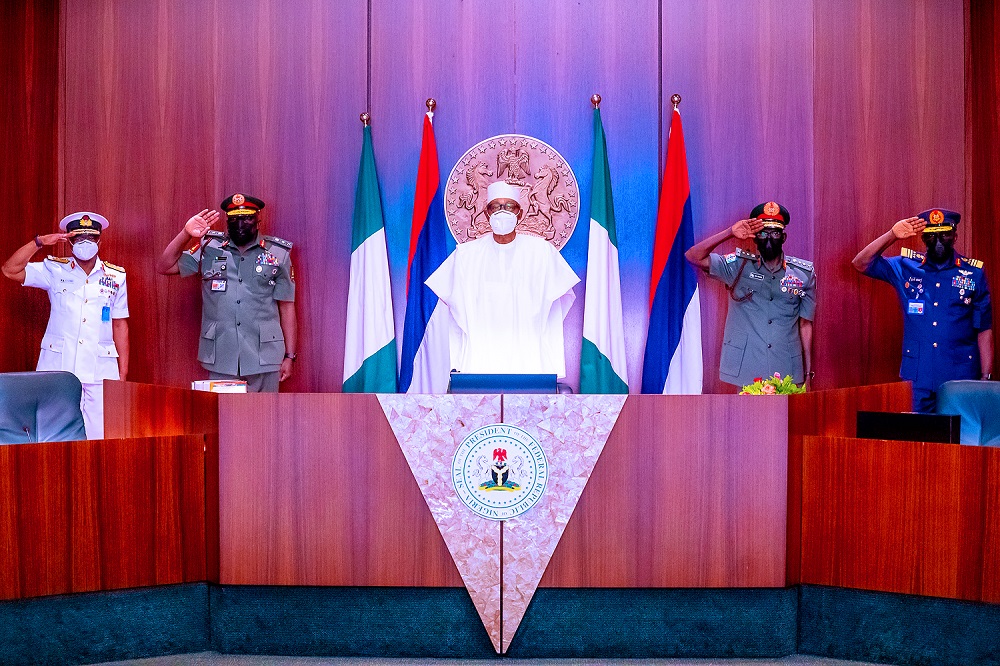In the wake of recent spikes in insecurity in the South-East and South-South zones, the National Security Council met last week, with President Muhammadu Buhari as Chairman and took far-reaching decisions. Among such decisions was that the country’s security establishment had to stabilise the situation within three weeks. Others were the full deployment of the planned escalation of the kinetic war format by the military and a clampdown on leakages of information in respect of measures, strategies and tactics to be adopted by the government in tackling insecurity.
Understandably, the new resolve of the government was spawned by recent developments in the South-East and South-South zones, where the ubiquitous, unknown gunmen wreaked havoc throughout the entire zones as they launched unprovoked attacks against public institutions and even killed security officers. As at the last count, victims of their outrage included the Nigeria Police Force, Imo State Headquarters, the Imo State facility of the Nigeria Correctional Services (prisons) where an estimated 1,800 detainees escaped unlawfully, as well as the country home of the Governor of Imo State, Hope Uzodinma. Beyond attacking the facilities, the unknown gunmen also gruesomely killed soldiers, police and Customs officers on official duty.
- Kaduna shutdown: FG intervenes as El-Rufai, labour stick to their guns
- Buhari seeks approval for fresh N2.3tr loan
Against the backdrop of the trending state of insecurity, the attack on security establishments and personnel clearly raised the bar with respect to the level of criminality in the two zones. This situation accentuated the underlying face-off between the Nigerian security establishment and a new militant factor, which goes by the name, Eastern Security Network (ESN) and an off-shoot of the proscribed Indigenous People of Biafra (IPOB). In fact, investigations by the security establishment have claimed a strong nexus between the various attacks on the security establishments and the ESN. This situation easily establishes a prima facie case for the consideration of special security measures in respect of the South-East and South-South zones. To accentuate the public outrage over the situation the Governor of Rivers State, Nyesom Wike, imposed a dusk to dawn curfew in the entire state to facilitate the arrest of the dastardly dispensation.
The foregoing notwithstanding, the contextual features of best global practices in management of internal insecurity, and the peculiarities of Nigerian politics may not predispose the approach of the government as the most efficacious under the circumstances. Put in a more succinct form, the approach needs to be handled with utmost discretion before it escalates into unintended outcomes. At least, two factors dictate a less incendiary approach to the zone’s insecurity issue. Firstly, is the political factor, which the government must avoid a situation whereby Nigerians will be pitched fighting their fellow Nigerians. After all, it is not the entire areas of the zones, but pockets of restive interests that are responsible for the state of anomy and therefore qualify for resolution. Hence adopting a mass attack strategy like the German ‘blitzkrieg’ under Adolf Hitler during the Second World War, may prove counterproductive, as such may generate unintended collateral damage in the theatres of military activity. Secondly, is the issue of logistics whereby with the proliferation of raging theatres of crises across the country, the government may find its resources stretched too thin to achieve a surgical operation in the affected zones.
It is for the foregoing reasons and others that several well-meaning voices have canvassed the imperative of having a comprehensive national dialogue where the various contending issues, which are tearing away at the joints of the country, shall be addressed and hopefully resolved. For as is not in doubt, the core issues over which the dissenting Nigerians are bellyaching and even bearing arms against the country are matters that can be resolved sustainably through dialogue and willingness to concede for each other by the various parts of this multi-ethnic and multi-religious country.
In summary, great nations of the world that feature the co-existence of several constituent parts, were not bonded by the spoils of war, but by negotiated terms of co-existence. Nigeria’s path to peaceful co-existence of its disparate ethnic nationalities, cannot be otherwise.

 Join Daily Trust WhatsApp Community For Quick Access To News and Happenings Around You.
Join Daily Trust WhatsApp Community For Quick Access To News and Happenings Around You.


